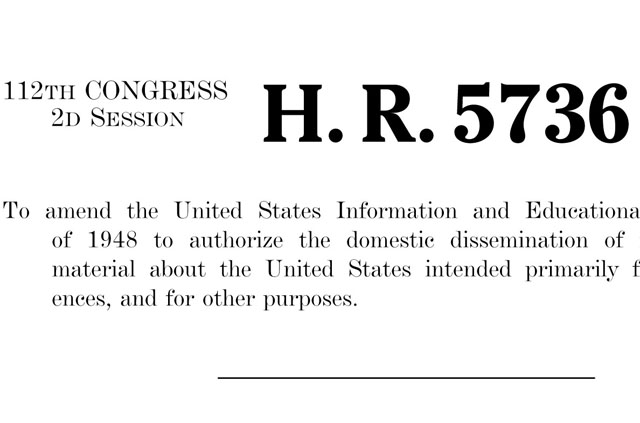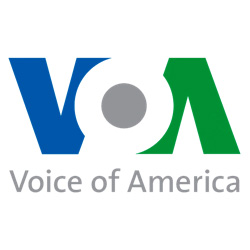
Propaganda? So what?
Since the introduction of the Smith-Mundt Modernization Act of 2012 as an amendment to the National Defense Authorization Act (NDAA) of 2013, there has been a surprising amount of attention to the fear of the American public being subjected to propaganda. The Act would remove the restriction currently in place that bans the dissemination of government material produced for overseas consumption from being made available to the American public. Let’s ask a lot of questions.
For a moment, let’s assume this is true and assert that the American public will be subjected to the same “propaganda” as issued by the U.S. Government overseas. What is it exactly that we are worried about? Are we to assume that the messages we issue overseas are somehow unfit for the American public? If so, why is that? Is the information untrue? If it’s untrue, then it’s disinformation, and I don’t want that broadcast in my name—so let’s fix it.
Edward R. Murrow, the often-quoted father-figure of American public diplomacy and first head of the U.S. Information Agency, remarked on what makes good propaganda:
…truth is the best propaganda and lies are the worst. To be persuasive we must be believable; to be believable we must be credible; to be credible we must be truthful. It is as simple as that.
Now, let’s assume the American public will be able to access all the information the United States publishes for foreign consumption online. Actually, we don’t need to assume this, because it is already true. Practically any Google search of an international or foreign policy issue generates results from Voice of America,  which technically, under Smith-Mundt, Americans aren’t legally allowed to receive—it’s essentially legally codified censorship. In fact, I would argue that it’s a violation of the First Amendment, as it restricts freedom of the press. Foreigners can view it, but Americans aren’t allowed to? Smith-Mundt is outdated, ineffective, disabling, and arguably unconstitutional.
which technically, under Smith-Mundt, Americans aren’t legally allowed to receive—it’s essentially legally codified censorship. In fact, I would argue that it’s a violation of the First Amendment, as it restricts freedom of the press. Foreigners can view it, but Americans aren’t allowed to? Smith-Mundt is outdated, ineffective, disabling, and arguably unconstitutional.
Making information readily available, propaganda or not, subjects it to more scrutiny and analysis directly by the people who are paying for it in the first place. It creates more transparency and accountability, and eliminates the domestic media as an intermediary. Should we rely completely on private media to decide what government-produced information we should or should not be issued? Why should we let CNN or Fox News decide for us? Doesn’t putting the information out there for public viewing make the private news we rely on more responsible for debating it? Shouldn’t we be able to know what we are broadcasting or publishing overseas?
So again, let’s assume that our foreign “propaganda” will be made available for domestic consumption. In today’s increasingly skeptical, informed, and interconnected society, who’s to say that such propaganda could be effectively used for nefarious purposes? This material should be available for scrutiny.
For a split moment, let’s think about the example of the BBC, which is funded by the British Government. What if the British weren’t allowed to watch or listen to material created by the BBC for international broadcasting? Doesn’t that seem a bit absurd?
Helle Dale of the Heritage Foundation succinctly lays argues against the irrational fears of propaganda:
Critics have already voiced concerns that this will open the floodgates of propaganda by the U.S. government. This is hardly likely. Indeed, access to programs and materials produced by the State and the BBG will allow Congress and the public a better understanding of what we are funding. Much of it is high-quality journalism, which deserves support, and some programming could have a positive impact on certain immigrant communities in the United States that are vulnerable to radicalization. As for programming and materials that are controversial, questionable, or wasteful, doesn’t the U.S. public deserve to know what is being published or broadcast in its name?
The fact of the matter is that Americans are subjected to propaganda in a variety of forms. Political campaigns are propaganda. Tourism ads are propaganda. Thomas Paine’s Common Sense was propaganda. Standing on the National Mall surrounded by monuments is propaganda. What is it that frightens us?







A partial answer to your final question at
http://www.publicdiplomacy.org/19.htm
[…] Wallin: Propaganda? So what? […]
[…] this passage meant that Americans could potentially be “propagandized” by their own government, so what? In reality, Americans could already access a great deal of these broadcasts through the internet. […]
[…] just seemed like another form of persuasion, which was reflected in their blog titles: “Propoganda? So What?” “Much ado about State Department ‘propaganda’“; “Dial back the outrage.” […]